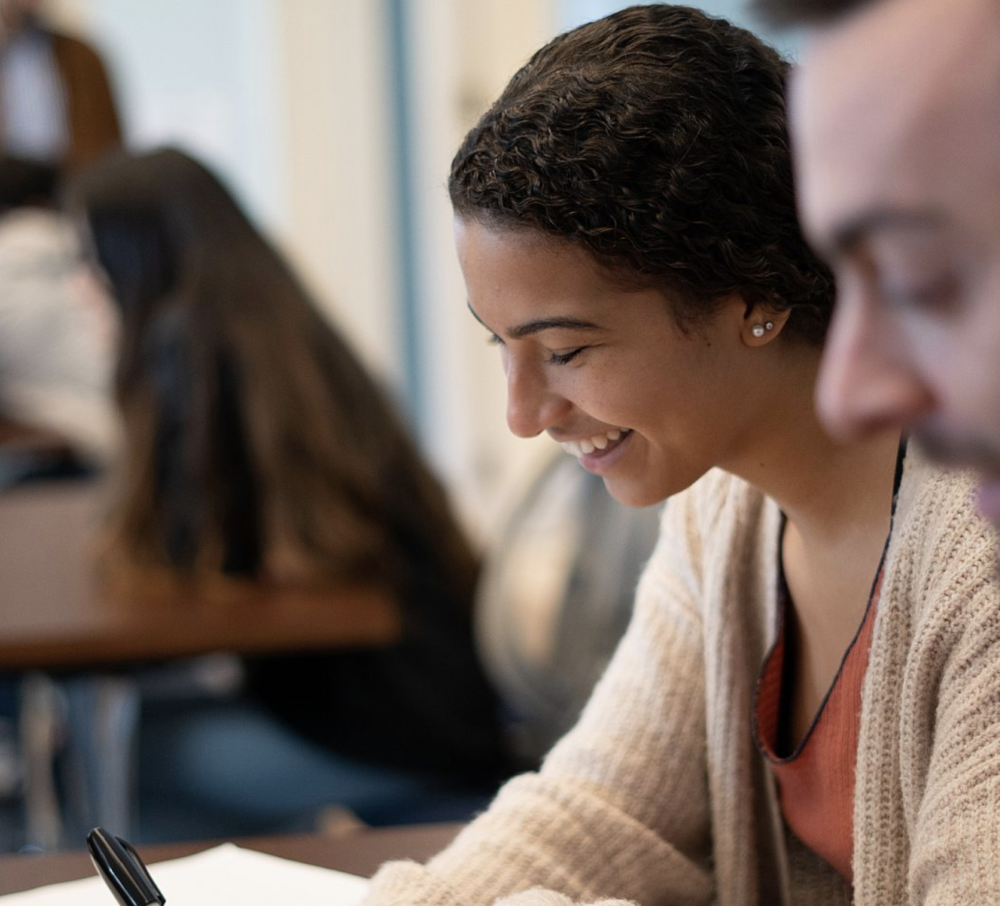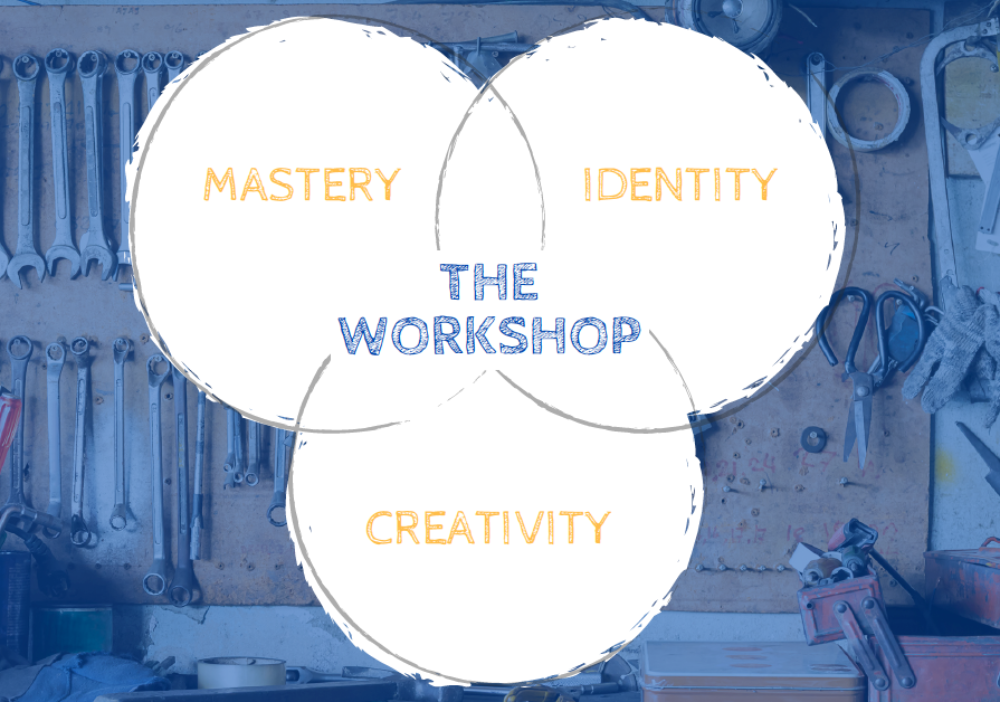Mastery, Creativity, Identity: What Students Can Teach Us About Redesigning School
Andy Housiaux is the Currie Family Director of the Tang Institute at Phillips Academy Andover. He is also an instructor in the Philosophy and Religious Studies department. This is the first post of two about the design of the Workshop. This post reviews core design principles, and the second post reflects on the Workshop’s debut in 2020. Look out for the second post in the coming months!
If you wanted to reimagine school, where would you start? And how could you make it a place that was designed for deep and durable learning?
During the 2019-2020 school year, a group of teachers at Phillips Academy had the opportunity to design an immersive, term-long program called the Workshop. The basic parameters were:
- The Workshop would be a student’s sole academic commitment; they would stop all other classes.
- It would be ten weeks long.
- It would be made up of 17 students and six teachers (who would teach part-time in the Workshop and continue to teach other courses).
- It would be ungraded. We developed three mastery credits and used the Mastery Transcript.
- The theme would be "Community, Class, and Carbon."
The teaching team spent a year in reading and research, school visits to exemplary sites like Tulsa Term and Casco Bay High School, conversations with researchers at IDEO, and close collaboration with learning organizations like Global Online Academy (GOA) and EL Education. Just as important, we interviewed each of the 17 students who would participate in the program. We asked each of them why they chose to do the Workshop, their views on Andover, when they changed their mind about something important to them.
The most revealing question we asked, though, was this one, suggested by GOA: What’s the best work you’ve done at Andover, and how do you know?

In a series of interviews, Andover educators asked students to share stories of their best work. They used those stories to inform the design of the school's new immersive program, the Workshop. Photo courtesy of Phillips Academy.
The students’ responses varied, but certain themes emerged that aligned closely with the research of Jal Mehta and Sarah Fine, who wrote in their book In Search of Deeper Learning:
“In the spaces that teachers, students, and our own observations identified as the most compelling, students had opportunity to develop knowledge and skill (mastery), they came to see their core selves as vitally connected to what they were learning and doing (identity), and they had opportunities to enact their learning by producing something rather than simple receiving knowledge (creativity).”
The students’ thoughtful insights helped us understand how these three elements—mastery, identity, and creativity—lead to learning environments and assessments that inspire meaningful, sustained engagement.
Mastery: Developing an “Ethic of Excellence”
During her interview, one senior spoke about a piece of creative nonfiction as the best work she had done at Andover. She was driven by something internal: “It was like I could spend hours looking through this paper. I did not want to do anything else…I mean, there’s plenty of papers I wrote: ‘You know, this is good. I can pass this in now, like, whatever.’ But I continued. I wanted to keep fixing this one.” Only after immersing herself in the writing process did she produce work that met her own standards: “When I finished it, I realized there was nothing to fix…When I look back, there’s—there’s not a thing I want to change, and that’s how I know.”
Compare this reaction to what this same student said about a more traditional assignment: “I can’t pull up a test and be like, ‘I love this test. This was a great test.’” Tests are done for someone else: the teacher. The essay, by contrast, was written and rewritten not for the teacher (or a grade), but to embody a vision of excellence that this student held herself to.
Identity: Seeing Oneself Reflected in Authentic Work
Deeper learning can also occur in well-designed projects, especially when students have the opportunity to learn more about themselves and their community. In another interview, a student spoke about his best work occurring in an economics class that partnered with Harvard Professor Raj Chetty’s Big Data course. It was “a project on equality of opportunity back in our hometowns. I had even worked on that [topic] in the summer for my hometown paper about West Virginia's economy and why it's been diminishing.”
Here, this student was able to use tools integral to the discipline of economics to answer questions that had deep personal relevance: What was happening to his hometown economy? How could he better understand political and economic trends by looking at research and data dating back several decades? To address these questions that connected him to this work, he had to become a better economist; mastery and identity were closely linked. Even though this student was at boarding school, away from home, he noted: “I learned a lot about back home being here”— an outcome that was possible only because of a pedagogical approach that asked students to learn complex skills in the service of understanding questions of deep personal relevance.
Creativity: Pursuing One’s Own Line of Work
Our interview with a third student revealed a multi-year journey toward deeper learning that began in 11th grade. This student was initially skeptical of a teacher’s prompt to write about gender. However, she found new ways to understand herself and her world using this lens. “From that point on,” she said, “for all my essays in English class, I found myself cycling back to themes of gender: being watched in a gendered context, or self-censorship in a gendered context.”
This student had the opportunity for choice in multiple courses, giving her the opportunity for creativity alongside the pursuit of intellectually rigorous work. Her 11th grade history essay researched the role of the U.S. military in Korean prostitution. In 12th grade, this student did two independent research projects. She wrote and directed a play about so-called comfort women in Korea during World War II, building on the work from her history course. She also made a presentation to the community about Asian femininity in Miss Saigon. In our interview, she pointed to the Miss Saigon presentation as the best work she’s done at Andover.
Even more important, she spoke with pride about “her line of work”—a series of linked inquiries over two years that explored and returned to themes of gender, power, and identity. How many of our students can say they have a line of work? What would be necessary for this to be the case for all students, and not just a fortunate few?

Design Principles of the Workshop
How might we design the Workshop so that the transformative experiences that students described above were central, durable features of a student’s experience in the Workshop? To do that well, we realized we needed to reimagine two fundamental aspects of schooling in particular: time and assessment.
Time: Effectiveness, Not Efficiency
Our decision to ask students to stop all of their other classes meant that we could experiment in new ways with time. In a traditional school schedule, a major pedagogical question is efficiency: how can a teacher cram as much learning as possible into a pre-existing unit of class time – one that may or may not be well-designed for the specific learning goal? In the Workshop, by contrast, we could replace the logic of efficiency with one of effectiveness: we could first determine what the most meaningful learning experience was and then design our week around it. Because we did not have traditional constraints and were not bound by the grid-like daily and weekly schedule, we could set up longer chunks of time that would allow for deep learning and engagement. This flexibility also made it possible for us to schedule off-campus learning experiences that would bring students out of the classroom and into a range of contexts and environments.
Assessment: Evidence, Not Evaluation
We were committed to assessing students differently as well. We jettisoned our traditional grading scale and developed three mastery credits: civic engagement, practice and craft, and learning to learn. We did not want students to “do school” (to use Denise Pope’s phrase) and perform for grades; instead, we built out rubrics and asked students to analyze exemplary work, helping them to see the intentional choices that scholars and artists made. This close reading would help students better understand the ways in which they could bring their interdisciplinary projects to life in terms of content, structure, and storytelling.
Furthermore, we wanted students to dedicate regular time to self-assessment and self-reflection, and we built in opportunities for daily meditation and introspection. Because we believed in the potential to connect this work to the broader community, we asked students to write weekly blog posts that we would publish on our website. We designed public-facing assessments that would ask students to produce work of authentic value to our community partners and would be compelling to a broader, public-facing audience.
Rethinking time and assessment, centering student voice and choice, providing opportunities for authentic engagement and assessment: these essential elements, we believed, would lead us to an educational experience with rich potential for transformative, deep learning. In part two of this series, I'll recount how implementing these principles worked - amidst a pandemic! - when the Workshop debuted in March 2020.
Want to read more about integrating student voice into the design of learning experiences? Read these GOA articles:
- Four Skills that Matter for Deeper Learning, According to Students
- Mission in Action: How Designing for Student Voice Can Drive School Mission
- Student Spotlight: How to Build Three Essential Lifelong Learning Skills
GOA partners with schools and learning organizations to support teacher growth, design and implement school change initiatives, and develop online and hybrid learning strategies. Explore our facilitation and consultation services. We also offer passion-based online courses for students and educator courses and programs that focus on high-quality, learner-centered design.
